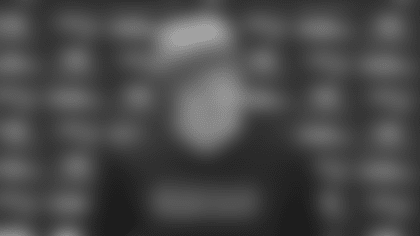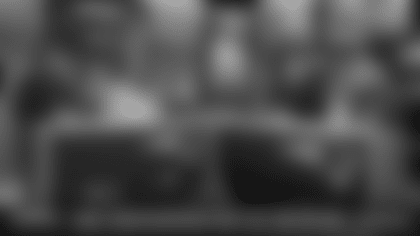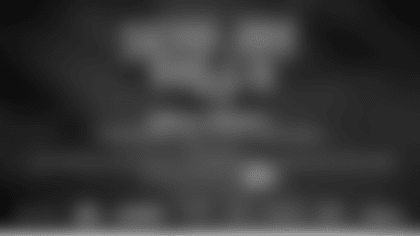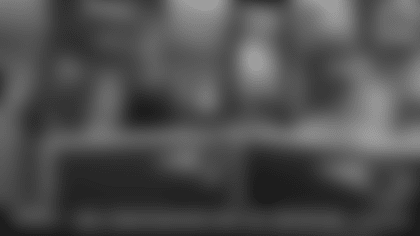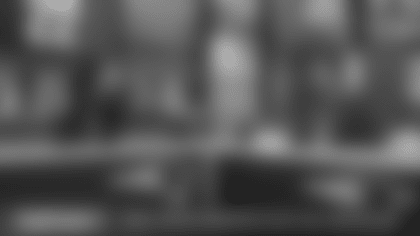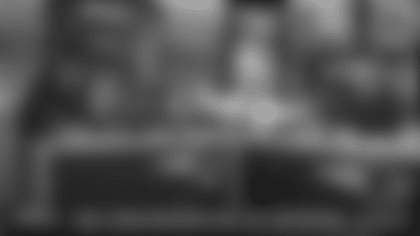PATRIOTS HEAD COACH MIKE VRABEL
PRESS CONFERENCE
July 22, 2025
MV: Welcome. Welcome to Training Camp 2025. I know Stacey [James] kind of talked to you. We're going to trim through these guidelines and figure out so that you guys can get what you want from practice. We'll try to give you what you can, and we'll try to communicate that daily. So, hopefully there's not a million rules, but a few guidelines that you could follow, and we can all work together. I understand you guys have got a job to do. We appreciate the job that you do and the job that we have. So, we've got everybody in here. We had an early group that started a couple of days ago, which was the rookie class, quarterbacks and then some players that may have been not full or 100% in the off season. That was the first group, just to kind of get them in there and get them acclimated. The rest of the group reported this morning, went through physicals, had a great run test; we just finished that. Then we'll start here with meetings after lunch. So, a couple of players that probably are on a few lists. There's two lists that we're working with now as it relates to the roster: the PUP list, which would be [Austin] Hooper, [Mack] Hollins, Vederian Lowe, and [Jahlani] Tavai. I would expect Tavai back out there tomorrow. Those other three probably will be sometime after that. The NFI list, which would be [Carlton] Davis [III], [Josh] Minkins, and [Jeremiah] Webb. I would expect Davis and Webb back out there with us tomorrow, and then Minkins maybe a few more days. So, those are just some housekeeping items and just some lists that we've used to start camp. So, with that, what do you got, Karen [Guregian]?
Q: With the news that Stefon Diggs has been cleared for practice, presumably passing the physical, what does it mean to you that he is ready to start camp just eight months after ACL surgery?
MV: Well, I know that everybody heals differently, especially from that type of injury. But I would say that I think it's just a testament to how hard he worked. Marcus Epps also went through that surgery and worked extremely hard, and he's been out there the last couple days with us as well. So, I appreciate their efforts to get back out there and get ready, and then we'll continue to monitor as we work through training camp.
Q: Do you still have [Diggs] on any sort of pitch count or anything, or is he full go?
MV: Well, I mean, I would say, I'm going to try to just explain it. When he practices, when he took the rep, it was full go. Everybody, every day is going to have a different plan. There will be some players that aren't out there for individual. There will be players that are just out there for team. There will be players that are just taking some specific reps. My job is to manage that each and every day, but to ensure the football team that everybody's working, whether that's with Frank [Piraino], Jim [Whalen]'s staff or with the coaching staff on the field. So, I don't see any limitations right now. Is he going to take every single rep of every single period? No, and I don't think any player will. But I think we're off to a good start and encouraged by what we saw here in the last couple of days.
Q: Mike, is Terrell [Williams] here?
MV: Yep, Big T is here, ready to go. He's been out on the field with us the last couple of days. Players were excited to see him. I was excited to see him, and we'll move forward.
Q: Mike, just so we're accurate on the Diggs stuff, did he pass his physical?
MV: Yeah, you can't practice if you don't pass your physical. That's what these lists are for, I apologize. So, that's some of the housekeeping that you go through when you're not fully cleared to start camp. That's where you introduce some of these PUP and the NFI. So, yeah, you can't practice without passing your physical.
Q: You said how critical this month was when they were off on their own. If I remember correctly, you might have said it was one of the most important junctures of the year. What is your level of satisfaction with these guys?
MV: Well, I think just based on the conditioning test, based on everybody at their weights, where we asked them to be in the conversation, I thought we met expectations in that regard. But ultimately, it's about the football conditioning, right? The in-line combat with another player, and then being able to go and chase the football and do it repeatedly, a receiver to run a route downfield and not get the football, but still come back to the huddle and play the next snap, and to be able to have that competitive stamina as it works through practice. Then, you'll see us try to build those reps through practice to get close to where we need to be for the game. So, the in-line conditioning test is one thing. We'll have to continue to practice the way that we want to play, which is critical to be able to create our identity.
Q: How has Terrell Williams helped you in the past? I know he's been with you for a while.
MV: Yeah, I mean, he's the only D-line coach that I've had. Just a great reach to every player on the football team. I saw him reach young offensive linemen that were across the ball, but he worked with [them] extensively in different drills or pass rush drills. He's got a great perspective. I think it's just helped me personally to kind of reach guys that maybe I haven't been able to reach. He's been a great mentor for young coaches as well. I think our players have always responded very well, and his units have always been prepared and productive no matter who he was coaching.
Q: Is [Williams] full go, himself?
MV: God, no coach should be full go, including this one. I haven't seen any restrictions. He's not on PUP, and he's not on NFI.
Q: Mike, were you a big first meeting to set the tone and expectations type, or do you kind of relay that message as you've gone from when you started to now?
MV: I mean, I think every meeting, we try to have a message, and we try to not waste their time. I found that consistency usually is the best, and sometimes that gets redundant for some guys, but the things you emphasize are usually the things that you get and the things that you make important. So, I try not to give them a ton of stuff, but certainly things that I think are going to be important. For example, training camp. I think our objectives that we're going to talk to them about and have talked to them about is, it's time to build a team. We have to start coming together as a football team. The groups that we're going to use, the special teams unit, the different personnel grouping on offense and on defense, that all has to come together, and that has to happen. The other thing is they have to earn a role, and that's a great time for them to personally earn a role through training camp, is what they can do for the team, how they can help us, how they can help themselves. There's a lot of different levels to what those roles are, and in my 14-year career I've had plenty of them: from special teams, multiple-position backup, to starter, a starter that was expected to be productive, to a veteran leader. So, there's multiple levels of what that role will be, and it's up to them to earn it. Then obviously, we have to prepare to win, and that will be my job as we work through training camp to make sure that we're doing all those three things.
Q: Mike, with the practice restrictions that the league puts on every team for the first few days, how do you handle the first few days? Is it teaching? Is it competition? Is it similar to OTAs?
MV: We'll try to get as much done as we can in 90 minutes. We'll try to get as much done as we can in an hour and five minutes. We'll try to get as much done as we can in an hour and 20 minutes, and we're always trying to do those things. There will be days where we just walk through, and you'll say that's probably unique or new, but we still have to stay with our installation schedule. We're not necessarily giving them a day off. We're coming in, we're meeting, but when we go out on the field – maybe it's every fourth day – we're trying to stay on our installation, do third down, do red zone, but maybe at a walkthrough pace. But that gives us an opportunity to break up into two spots to where you've got an offense and defense going against each other, and an offense and defense going against each other. So, everybody's working. Nobody's standing around. They're actually in there. They can take a rep. They can take a walkthrough rep. They can see themselves on film. We just try to, whatever the rules are, we try to follow them and make sure that we're coaching and teaching, being creative, and then also obviously competing when we're out there.
Q: In the spring, you and Drake [Maye] talked about the increased level of expectations going into this season. I'm curious, when you flip around to the other side of the ball, do you view Christian Gonzalez through that same lens?
MV: I would hopefully view everybody in that lens. I mean, expectations in the National Football League are high. They should be. That's what our job is. So, everybody's got a different situation, things that they're trying to get done, things that they want to accomplish. My job, my biggest job and one of my most important jobs, is to try to get the individual to be able to maximize their earning potential within what we're trying to do as a football team, right? Those two things can coincide. We all understand, we're in this business, we're in professional sports – outside of winning – to provide for our family. That's what this is. It's professional sports. So, with that is you have this individual element, and you have this team, and they have to coexist. You have to allow players to understand that, show them where they're doing things to help themselves but maybe not the team, and then show them examples where they're helping themselves as well as the team and understanding how those pieces can fit together.
Q: Mike, in answering Ben's [Volin] question, you said, as coaches, you guys try to be creative. I'm curious, how do you try to challenge them? How do you make it hard for them during camp without physically driving them into the ground?
MV: Well, we're always in the meeting room. We're trying to stimulate them. We're trying to ask a lot of questions and make sure that they know what they're doing, that the guy next to them knows that he knows what to do. On the practice field, you try to create individual, 1-on-1 competitions, whether that be an open-field tackling drill, 1-on-1 pass rush. We'll do different drills. We'll do fit drills with the O-line and D-line where they're fit into a position. We're trying to take helmet contacts off of them, but still work the in-line, hand replace, sinking their hips, working their shoulders square, running their feet, all these things that would go into a block but not lining them up across and taking the helmet contact away. So, you'll see some of that that may or may not have happened here before; that'll be new. So, if you're wondering what that looks like tomorrow, that'll be that drill. We try to practice with an energy. There's an urgency to the way that we practice. We don't sit there and spend a whole lot of time. We're back in the huddle; that's how a game goes. We don't really have time to sit there and waste on what happened. We'll get it fixed eventually in the meeting room, but we have to be able to process information, move on quickly, get back to center, run the next play and realize what the next situation is.
Q: Mike, what's different about the way you designed or prioritized things in camp this year from maybe your first couple years as a head coach?
MV: I mean, you just try to tinker a little bit with the schedule and try to figure out when the walkthroughs are going to be, the morning meetings, what time do you want to make practice, providing enough time for them to lift and build a routine within that schedule, and then also trying to be efficient with the coaches' time so that they can script at night, be ready to go the next morning, still come in here with some energy and have some excitement for when the players come in here, ready to teach them.
Q: How important are pads and contact when it comes to player health and safety and getting them ready for the season, and how do you strike that balance between ramping up the intensity, but not doing so much that it's detrimental?
MV: Well, I mean, anything that we do on the football field has an element of risk. It's a violent sport. It's played at a high rate of speed, and you can't sit there and walk through, but you can't sit there and go live to the ground every play and every day. So, there's just a balance that we strike, and we have to – again, part of that is preparing to win, being able to have the full complement of the playbook, being able to run the football, being able to throw play passes and run actions and get down to the red zone. You're going to have short yardage. A lot of games are determined at low red zone and short yardage, and those are things that you have to be able to do. Sometimes you have to pull the reps back, and again, that gets evaluated every single day based on the health of the team, where we're at and what I think we need. We have an idea of what practice is going to look like, but sometimes that gets adjusted based on where we're at.
Q: Mike, you said in January that you guys just want to be good enough to start to take advantage of bad teams and you weren't sure if you were there yet. Do you have any more clarity as to whether you're close?
MV: Well, we're closer than where we were in March or April when we got here. I think we are. I think the players are starting to understand – we talk about the good, the bad, and the [expletive] that gets you beat, and I think that they can tell the difference between those three now. My job is to try to get them to — we have to eliminate the stuff that gets you beat, we just have to correct the bad, and we have to continue and enhance the good stuff that we do. So, those are the three buckets of film that we show them, and I can't always just sit there and show them the stuff that gets you beat because that gets old as a player. You're like, 'I can't just see this all the time.' I can't just show them all the good stuff because — so, I just try to — every time there's film, I try to show them those three buckets.
Q: Have there been any moments of eye-opening where they said, 'Yeah, I didn't know that was a bad thing to do?'
MV: No, I don't think we've gotten there yet, just from the way that the practices, I guess, have been structured in the spring. Right now, it's just being able to have an urgency – which we do – in operation, communication, all those little things, the ball security, which I think is probably the most critical, Taylor [Kyles], when you talk about just having a ball on your body, pads and contact. That's the biggest thing, is just our ability to be able to take care of the football and being able to create those types of plays defensively that would lead to turnovers. So, that's one of the biggest reasons just to have pads on.
Q: Mike, you called the five weeks over the summer one of the most important parts of the offseason. Now that the guys are back, I know there's 91 of them, how'd they do? How did you feel about how the guys came back?
MV: I mean, whether you were in a coma when I answered Tom's [Curran] question, typing on your phone or tweeting, I don't know, but I spent five minutes answering that question. I can go back through it, but I'd rather not. We won't know — we did pretty good on the linear run test, which they practiced; they knew what it was going to be. The big thing will come when they're in line contact. You're sitting there, you're wrestling with a guy, and then the D-lineman's rushing, he almost gets to the quarterback, but we're telling him to plant, run and go sprint to the football, and then go do it again. Or, we're asking Kyle Williams to go run a post, and he didn't get the ball, but he wanted to get the ball, but he didn't. Can he run back, get set and know what to do the next play? That's really where we'll see. So, I'll be able to answer that question, again, hopefully only once, in a few days.
Q: Mike, how much does competition play into this phase now, from when you were a player, just what you're going about on a daily basis, seeing guys rise in competition. What are some of the things you look forward to with that?
MV: I look forward to the first day of pads where there's somebody that we really never saw, we never really talked about, that once the pads go on and they start to play football, they just have a contact balance, they have an understanding of where the football is, they tackle well, they break tackles or they play better in pads. That happens every year in training camp, so that's probably, usually, my most exciting day is, who's it going to be? I don't know. It's a different guy every year. Hopefully there's a lot of them. But yeah, there's competition amongst – I mean, we're competing against each other. Positionally, we're competing against the other side of the football, and then our job is to compete against the other 31 teams that have the same amount of time as us every day. I mean, it is what it is. You have 11 hours. You've got to have this many days. You've got to have a day off every seven days. You've got three preseason games. So, it's, can we maximize our time versus what everybody else is doing?
Q: Mike, there's a lot of optimism because you're here as the coach. You've been on both sides of it as a player and a coach. As a coach, how much can you impact winning versus the players?
MV: Well, again, I have to continue to teach, develop and make connections with our guys. Through that, preparing them to win, and the situations, getting them to understand that there's different ways to win a football game. There's a lot of ways to lose them, but we want to focus on the ways that we're going to win, and sometimes that's going to be different each and every week with whatever that plan to win is each and every week. I have to try to do that. I have to get our coaches to do that and get our players to understand that.







